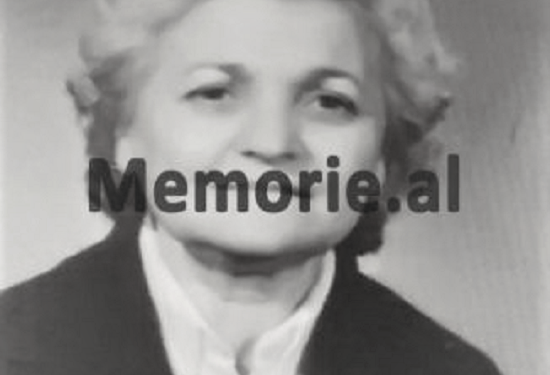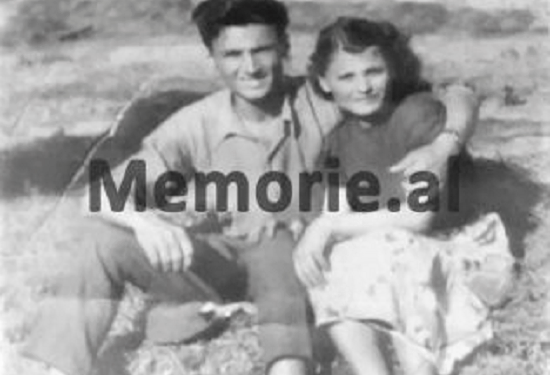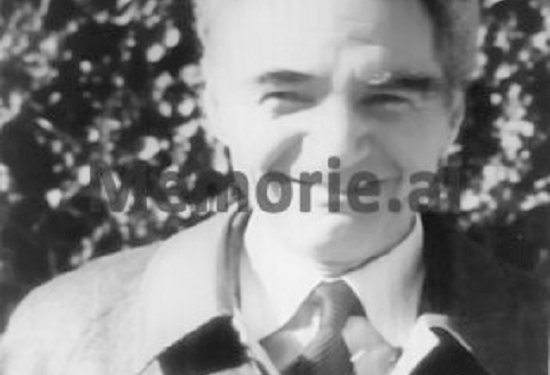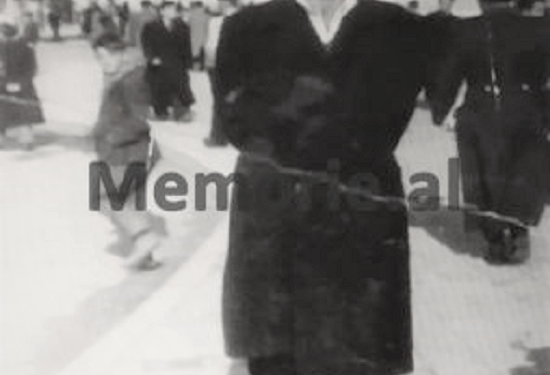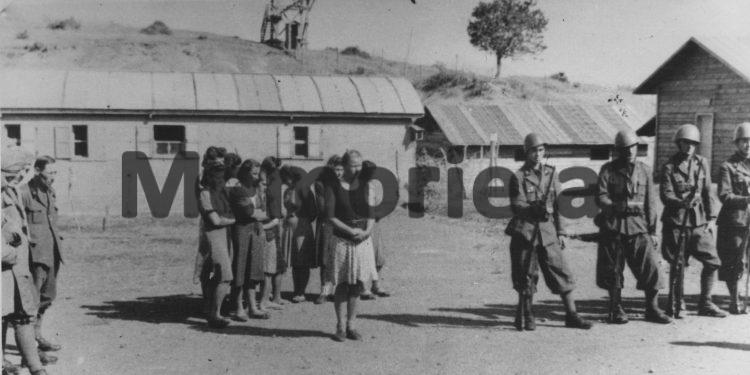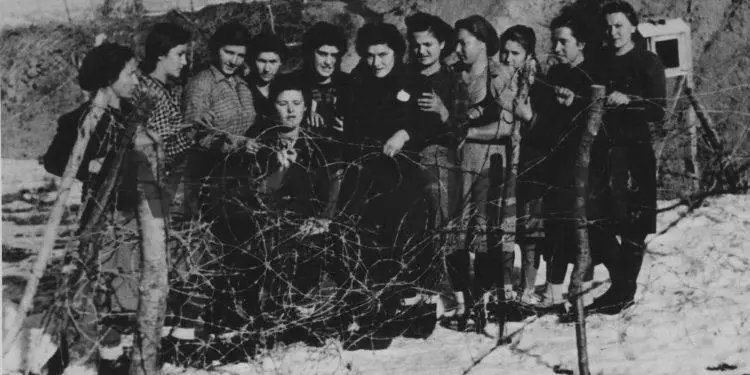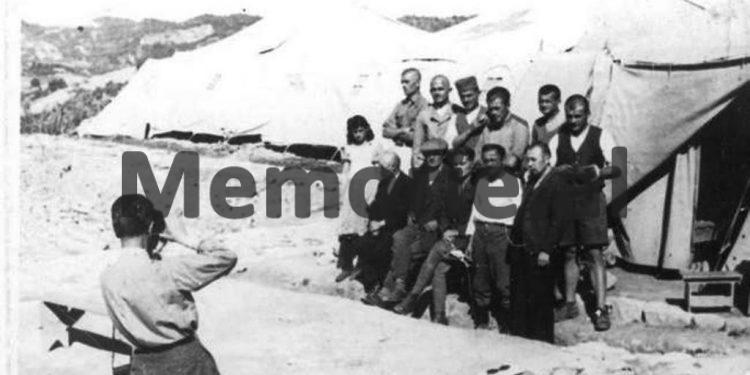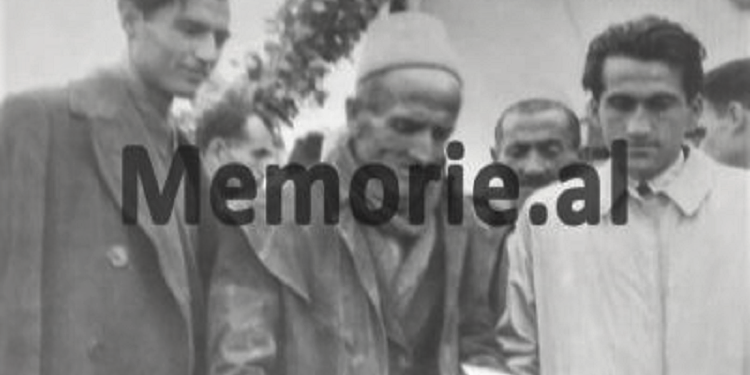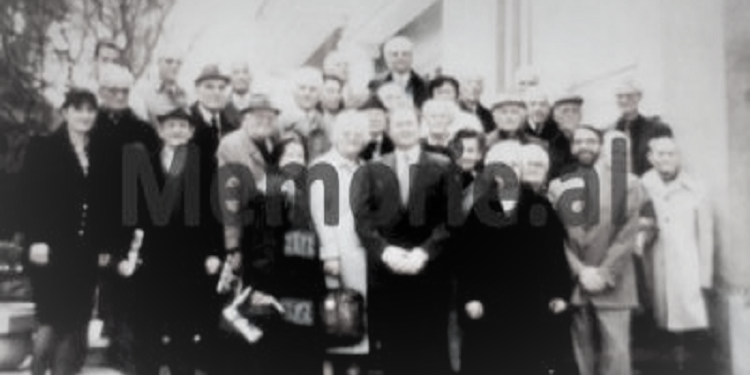Dashnor Kaloçi
Memorie.al publishes the unknown story of Luigj Filipi and his wife, Aleksandra Prifti, who during the period of occupation 1939-’44, were two of the active communists of the Tirana Region, participating in some sensational actions, such as and that of the abduction of the Gutenberg Printing House, which was located very close to the Questura. The testimony of Aleksandra Filipi, how she and her husband, Luigji, were arrested by the Germans, where after being held for some time in the Tirana prison, in August 1944, they were sent to the Prishtina Camp, together with many communists of others from Shkodra. The inhuman masquerade carried out by the Germans against the Albanian prisoners on October 23, 1944, where most of them were stabbed with knives and bayonets. The functions and duties performed by Luigj Filipi after the end of the War, where as Deputy Chairman of the Executive Committee of Tirana, he led a very simple life and never went to work by car. His appointment to the State Security at the ‘House of Leaves’, and his demonstrative departure from there, due to the machinations used there against innocent people and the attempt of his “colleagues” to physically eliminate him.
“Shortly after I and my fiancé Luigj Filip and I entered his house located on Kodra e Kuqe, I saw gendarmes at the windows who came in loudly and arrested me, Filip, and his brother Mark. “A few minutes before the gendarmes came to arrest us, Luigji had hidden some of the Party’s main documents in the tiles of the house, while I hid in my body a letter he had given me to keep.” The man who testified for the first time for Memorie.al is Aleksandra Prifti, the wife of former communist former Luigj Filipi and the daughter of the martyr Jovan Prifti, who tells the whole story of how she was arrested by the Germans in August 1944. together with Luigi and his brother Mark, who were then sent to the Prishtina Camp.
Who was Luigj Filipi, what was his past and what actions did he take during the war? What were the high functions he held after the end of the War, and why did the State Security set a trap to physically eliminate him, and how did he manage to escape from them?
Luigi’s arrest by the Germans
What happened next to Luigj Filip and his fiancée? Regarding this, his wife, Sandra Prifti, a former employee of the ATSH photographic laboratory, stated: “The arrest of Luigi, mine and his brother, Mark, was made because the Germans had accurate data on all our illegal activity. After we were arrested at Luigi’s house, the three of us were taken to the Police Station and held there for about a week, asking about our connections and the activity we had performed. They asked me what I had to do with Philip, and when I told them I was engaged, they didn’t believe me, saying, “That’s what you communists say every time we’re caught.” During the days we were being held at the Police Station, I was able to get a very conspiratorial letter to the WC, which Luigi handed me shortly before the Germans arrived, thinking I was a woman and they would not check on my body where I had hidden it. After they held us there for a week in the Police Station, Luigi and I and his brother Mark were sent to the Tirana prison. A week later, they brought my sister, Xanthippin, along with Vitore, Luigi’s sister. At that time, there were many communists and activists of the Anti-Fascist Movement in that prison, such as Vasil Shanto’s father with his daughter Bojka, Kosta and Taqi Mema, the two Papuçiu brothers from Fieri, Av. Sulo Bogdo, Kin Dushi, Gjikë Kuqali, Spiro Velko, Ramazan Shijaku, Niko Avrami, Gaqo Floqi, Grigor Gjika, Xhelal Glina etc. ”, Aleksandra tells about the former communists who were kept isolated by the Germans in the Tirana prison in August 1943 .
From Tirana to Pristina
After being held for about two or three months in Tirana prison, Luigj Filipi, along with his brother Marku and sister Vitore, as well as his fiancée, Aleksandra, and her sister Xanthippi, were sent to the German camp in Prishtina. , along with many other imprisoned communists held there. Regarding this, Sandra said: “On August 26, 1944, we political prisoners who were being held in the Tirana prison, ordered us all to go out in the yard, where the prison directorate together with the Germans appealed to us, calling us to all names for their presence. Then with some military trucks in which an officer and two German soldiers were armed, the convoy set off towards the northern national road, where after each car stood a German armored car. We did not know where they took us and we learned about our transfer from Tirana prison only on the evening of August 25, where many of the relatives of the convicts gathered in front of the prison. When the convoy took the road in the direction of Milot, we realized that we were heading towards the city of Shkodra, but again we did not know the exact destination where they had taken us. When we arrived in Shkodra, we were joined by some other prisoners who had been in the prison of that city, where I remember: Llazar Siliqi, Sabah Hilmia, Gac Mazi, Stefan and Vasil Pistoli, Seit Boshnjaku and Qemal Jashari, as well as sisters Marie Varfi and Despina Trimciev. The next day, we traveled on the Pukë-Kukës-Prizren road and in the evening the convoy of German cars arrived in the open field where the camp was “, Aleksandra Filipi recalled that distant day in August 1944, when the political prisoners of Tirana were sent to the Camp. of Prishtina.
The Prishtina massacre
During the period that Sandra and Luigi were isolated in the camp, one of the biggest massacres of the Germans took place: the shooting of 104 Albanian prisoners. Regarding this event, Sandra said: “It was the day of October 23, 1944, a beautiful morning, that, surprisingly, at noon the weather was noticeable and a thin rain began to seem as if something was going to happen. The barracks surrounded by barbed wire, which had once been horse stables, also housed prisoners. There were several hundred prisoners, and the Germans had divided us into separate bins. In a cauldron were the prisoners of Shkodra and a little further that of the women. The treatment of the Germans there was animalistic, because they put us to hard work and fed us very badly. Illness, torture, and hard work reduced the number of prisoners every day, but the cell of the communists, operating in complete illegality, tried to keep the morale of the comrades high. At that time, the Germans were very angry at the defeats they had suffered on the Eastern Front, and for fear of some internal revolt in the camp, they organized the massacre of 104 of our comrades. Since the Germans did not have crematoria or gas chambers in this camp, the only way to terrorize the execution of the convicts was with knives and bullets, which they never spared against our comrades. On the morning of October 23, sitting like beasts, they ordered the prisoners to line up in front of the silos. As we lined up in the convoy for five, we thought that they had taken us out to take some serious disciplinary action, and we never thought that the next massacre would take place. After all were lined up, they selected 100 friends from our ranks, who singled them out on one side. Among the comrades who were killed alone was Spiro Velko (Kosovo), a teacher by profession, who was also in charge of the Party cell in the camp. Among the other friends I remember there were Musa Agolli and Hector Shyti. Initially, they emptied the women’s caush, which, if you climbed on the ceiling, communicated with the caucus of the convicts from Shkodra. After carrying out all the formalities, the Nazis took 100 other comrades from the line and took them to a nearby valley, where they threatened to open a large canal-shaped pit under the threat of a cartilage. After opening the pit, the comrades returned them to their silos, and for a few minutes there was complete silence. Then, from the women’s silo where our comrades had entered, the Germans began to take them out two by two, and after passing them to the offices where they stripped them naked, they took them and shot them where the big hole had been dug. Some of the comrades who were in Kaush, when they realized what was happening, climbed on the ceiling and went to the other Kaush of Shkodra. While Musa Agolli and Spiro Velko were able to pass, Hector Shyti remained on the ceiling because the nails of the planks entered his stomach, because he was healthy. When they heard his screams, the Germans went inside and, after taking him out, stabbed him. After that, they entered the Kaush of Shkodra, where they took Musa Agolli and Spiro Velkon. Spyron was executed first, while Musa’s cries were very loud. After a grave silence, the Germans pulled Shyqëri Greblleshi out of the bush, who clashed with them and was left dead, naked and torn to pieces by their knives, bullets and bayonets. I remember when the Germans entered the women’s caucus, their clothes were stained with the blood of our comrades. The massacre lasted about an hour and a half and among our 104 comrades, Musa Agolli, Spiro Velko, Hektor Shyti, Xheladin Fishta, Shyqëri Greblleshi, Gjikë Kuqali, etc. were killed. After that massacre, as if nothing had happened, the Germans barely got us out of the barn to give us the dinner that consisted of 120 gr. bukand ”, concludes her story Aleksandra Filipi, regarding the massacre committed by the Germans in the camp of Prishtina, on October 23, 1944, where she was together with her husband Luigj Filipi.
Luigj Filipi, the guerrilla who hijacked the Gutenberg printing house
According to the testimonies of Mrs. Aleksandra Filipi, her husband, Luigji, was born on October 18, 1918 in the city of Shkodra and the early origin of his family is from Vranina. Luigi’s father was named Philip Jaku, and during World War I, he served as a translator for Austro-Hungarians, as he knew several foreign languages very well. Philip and his wife, Mary, had three other children besides Louis: Vitore, Zina, and Mark. Luigji took his first lessons at the Franciscan College in the city of Shkodra, where he had close friends Nikola Shurbani, and one of the professors who cared most for him was Father Gjergj Fishta. Due to the very bad economic situation in which he lived in the city of Shkodra, in the early 1930s, Luigi’s father, Filip Jaku, moved from that city and settled in Tirana, renting a house in Kodra. Red. To help his family, Luigji, who dropped out of college in his third year at the Franciscan College when he came to Tirana, did not go to school, but went to work as a typographer at the Luigj Gurakuqi Printing House. . He was well acquainted with the profession of typography, as in the banks of the Franciscan College of Shkodra, he had done teaching practice at the Printing House “Nikaj” of that city. Around 1936-’37, Luigji became associated with the Shkodra branch of the Communist Group in Tirana, due to his participation in the trade union activities of printing press workers. In those years, he was elected President of the Printing Trade Unions and organized several strikes against employers and the state administration. As a result of that union activity, he was fired and was no longer allowed to work in any of the printing presses that had started with the creation of the first groups, he continued even after the fascist occupation, where from the first days of April 1939, he was one of the organizers of the anti-fascist demonstrations that took place in Tirana. Luigji was a close friend of Vasil Shanto and Qemal Stafa, since the years when they had lived in Shkodra and he maintained that friendship during the time they came to Tirana. After the establishment of the Albanian Communist Party, Luigj Filipi became closely associated with Gogo Nushi who led the Tirana Circle and together with Mihali Durin, participated in some of the most important actions carried out by the communist guerrillas of Tirana at that time, where Luigji was one of the most members active. Back in 1942, after Luigji was accepted into the ranks of the Communist Party of Albania, the Communist Circle of Tirana and personally Gogo Nushi, entrusted to him the task of organizing the two partisan detachments of Dajti and Erzeni, which he successfully carried out. . Since Luigji had extensive work experience as a typographer, the main task assigned to him by the Communist Circus of Tirana was to prepare the technique for the SNP press. As part of the task assigned to him during that period, Luigji carried out even the most daring actions, such as the abduction of the Gutemberg Printing House and the Sun, which was located next to the Courtyard of the Questura. Due to his illegal activity, Luigj Filipi was arrested and imprisoned by the Italians in early 1942. After his release from prison, he was assigned the task of preparing the technique for publishing the newspaper “Zeri i Popullit”, number the first of which he prepared in Guru e Muzhaqit in Çermenikë, together with Sofokli Budo and his brothers, Andon and Qirjako Deçka. In August 1944, Luigji was arrested at his home along with his fiancée, Alexandre Prifti, and his brother, Mark. After being held in custody for a week, on August 25 that year, he was interned in a German camp in Pristina, along with his fiancée Alexandra, her sister, Xanthippin, and his brother, Mark and sister Vitore. From that camp they were released at the end of 1944. After the end of the war, Luigji worked in important positions, as Deputy Chairman of the Executive Committee and Chairman of the People’s Council of Tirana. Being a very simple man and an idealistic communist, during all that time Luigji worked at the head of the Tirana Executive Committee, he never agreed to go to work with his car. To this he said: “How can I drive myself to work, when at the door of the Committee, I am greeted by dozens of villagers who have sheltered us during the war, who ask us for a sack of flour because they have children without bread”? ! Around 1948, Luigji was assigned to work for the State Security at the “House of Leaves” and before he was one year old, he resigned and left because of the machinations used against honest people. . To demonstrate his departure from the State Security, a trap was set for him, where he would be physically eliminated by a car accident. But the night before he left on “service,” Luigji was notified by a close friend of his about the trap set by the Security, and he did not leave the house at all, becoming “sick.” After leaving the State Security, Luigji returned to his old profession of typography, working as a technician, and director of the Typographic Enterprise, until he retired in 1976. From that time until his separation from life on August 19, 2002, Luigj Filipi remained a simple man and very disappointed by the communist ideal, which he had embraced since his youth, family./Memorie.al




